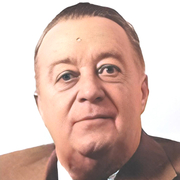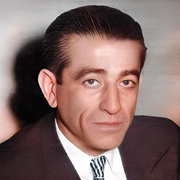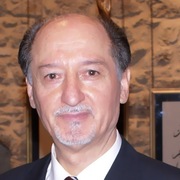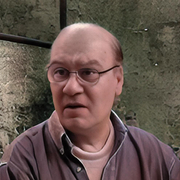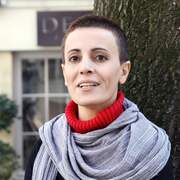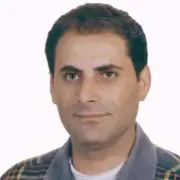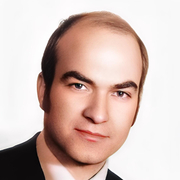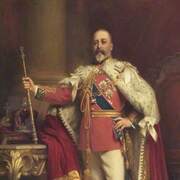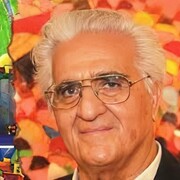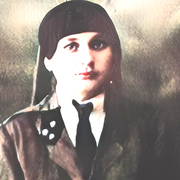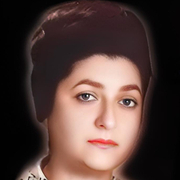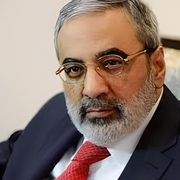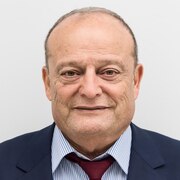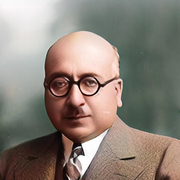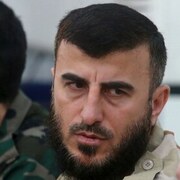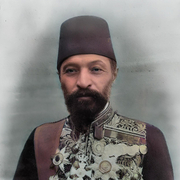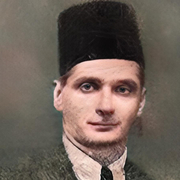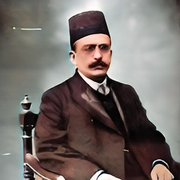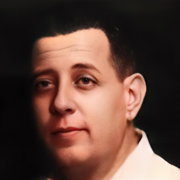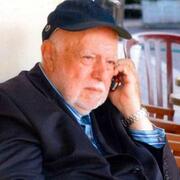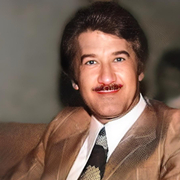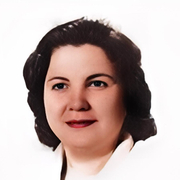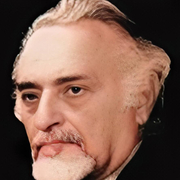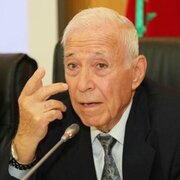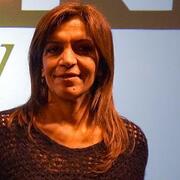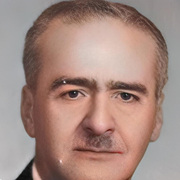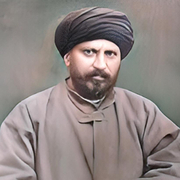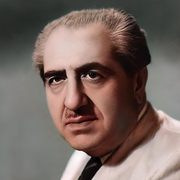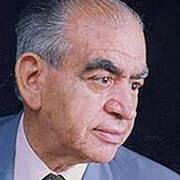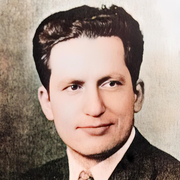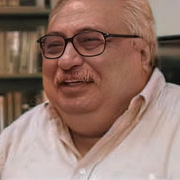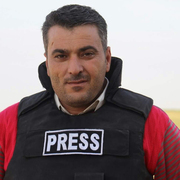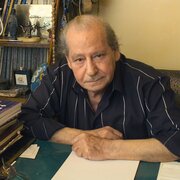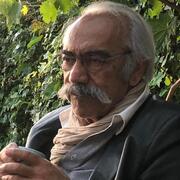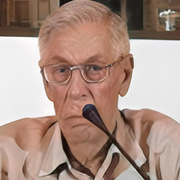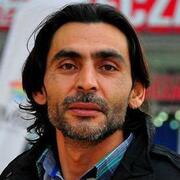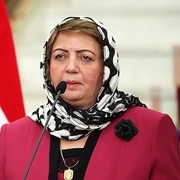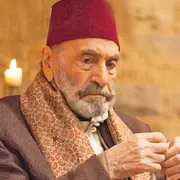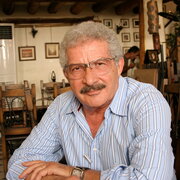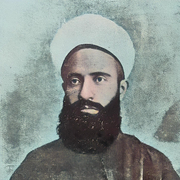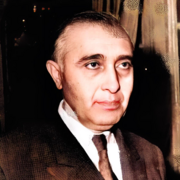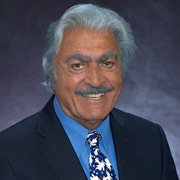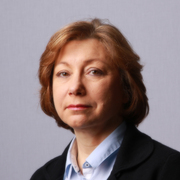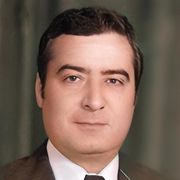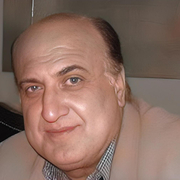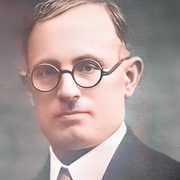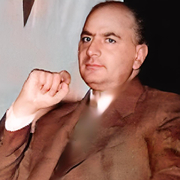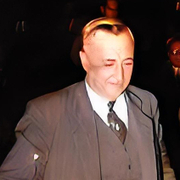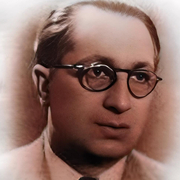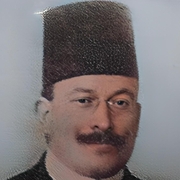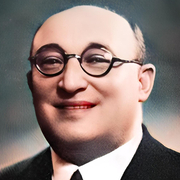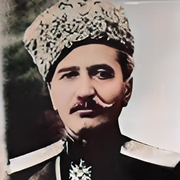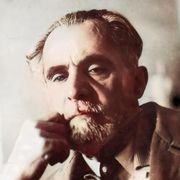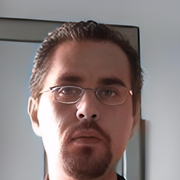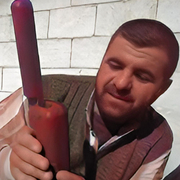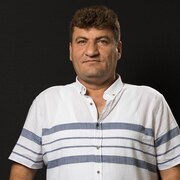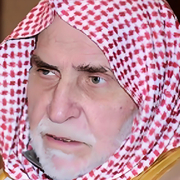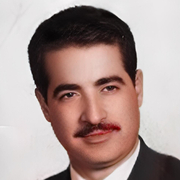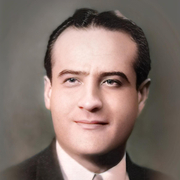 Mamdouh Adwan
1941 - 2004
Poet, writer and translator
Mamdouh Adwan
1941 - 2004
Poet, writer and translator
 Maarouf al-Dawalibi
1909 - 2004
Prime minister of Syria
Maarouf al-Dawalibi
1909 - 2004
Prime minister of Syria
 Riad al-Turk
1930 - 2024
Syrian opposition leader
Riad al-Turk
1930 - 2024
Syrian opposition leader
 Abu'l-Hasan al-Uqlidisi
920 - 980
Author of Kitab al-Fusul fi al-Hisab al-Hindi
Abu'l-Hasan al-Uqlidisi
920 - 980
Author of Kitab al-Fusul fi al-Hisab al-Hindi
 Khaled al-Asaad
1932 - 2015
Head of antiquities at Palmyra
Khaled al-Asaad
1932 - 2015
Head of antiquities at Palmyra
 Ulfat Idlibi
1912 - 2007
Novelist
Ulfat Idlibi
1912 - 2007
Novelist
 Jihan al-Mosli
1908 - 1996
Teacher and parliament member
Jihan al-Mosli
1908 - 1996
Teacher and parliament member
 Ibrahim Al-Omar
1978 - 2016
Camera operator for Al-Jazeera Mubasher
Ibrahim Al-Omar
1978 - 2016
Camera operator for Al-Jazeera Mubasher
 Lutfi al-Haffar
1885 - 1968
Founder of the National Bloc
Lutfi al-Haffar
1885 - 1968
Founder of the National Bloc
 Shuaib Al Arna'ut
1928 - 2016
Hadith scholar and editor
Shuaib Al Arna'ut
1928 - 2016
Hadith scholar and editor
 Adib Ishaq
1856 - 1885
Journalist and translator
Adib Ishaq
1856 - 1885
Journalist and translator
 Antranig Chalabian
1922 - 2011
Medical illustrator, cartographer, historian
Antranig Chalabian
1922 - 2011
Medical illustrator, cartographer, historian
 Louay Hussein
1960 - 2022
Writer and opposition activist
Louay Hussein
1960 - 2022
Writer and opposition activist
 Zaki al-Khatib
1887 - 1961
Prime Minister of Syria
Zaki al-Khatib
1887 - 1961
Prime Minister of Syria
 Ayyash Al-Haj Hussein Al-Jassim
1864 - 1926
fighter against French occupation
Ayyash Al-Haj Hussein Al-Jassim
1864 - 1926
fighter against French occupation
 Shafiq Ades
1900 - 1948
Ford car company agency in Iraq
Shafiq Ades
1900 - 1948
Ford car company agency in Iraq
 Fares al-Khoury
1877 - 1962
father of modern Syrian politics
Fares al-Khoury
1877 - 1962
father of modern Syrian politics
 Bassel al-Assad
1962 - 1994
Engineer, colonel, politician
Bassel al-Assad
1962 - 1994
Engineer, colonel, politician
 Muhib Al Din Al Khatib
1886 - 1969
Salafi writer and editor
Muhib Al Din Al Khatib
1886 - 1969
Salafi writer and editor
 Riad Ismat
1947 - 2020
writer, critic and theatre director
Riad Ismat
1947 - 2020
writer, critic and theatre director
 Nazik al-Abid
1887 - 1959
Women's rights activist, nationalist
Nazik al-Abid
1887 - 1959
Women's rights activist, nationalist
 Mohamed Haytham Khayat
1937 - 2020
Physician and lexicographer
Mohamed Haytham Khayat
1937 - 2020
Physician and lexicographer
 Sania Saleh
1935 - 1985
Poet and writer
Sania Saleh
1935 - 1985
Poet and writer
 Tayyeb Tizini
1934 - 2019
Philosopher, researcher and academic
Tayyeb Tizini
1934 - 2019
Philosopher, researcher and academic
 Shukri al-Quwatli
1891 - 1967
First president of independent Syria
Shukri al-Quwatli
1891 - 1967
First president of independent Syria
 Salom Rizk
1908 - 1973
Author, lecturer
Salom Rizk
1908 - 1973
Author, lecturer
 Ikram Antaki
1948 - 2000
Writer and philosopher
Ikram Antaki
1948 - 2000
Writer and philosopher
 Sa'id al-Afghani
1911 - 1997
Professor of Arabic language and literature
Sa'id al-Afghani
1911 - 1997
Professor of Arabic language and literature
 Francis Marrash
1836 - 1874
Scholar, publicist, physician
Francis Marrash
1836 - 1874
Scholar, publicist, physician
 Moustapha Akkad
1930 - 2005
producer of Halloween series and director
Moustapha Akkad
1930 - 2005
producer of Halloween series and director
 Riad Beyrouti
1944 - 2019
Painter and sculptor
Riad Beyrouti
1944 - 2019
Painter and sculptor
 Salma Kuzbari
1923 - 2006
Literary critic and biographer
Salma Kuzbari
1923 - 2006
Literary critic and biographer
 Nizar Qabbani
1923 - 1998
Poet, writer, publisher
Nizar Qabbani
1923 - 1998
Poet, writer, publisher
 Leila Mustafa
1988 - 2023
Co-chair of the Civil Council of Raqqa
Leila Mustafa
1988 - 2023
Co-chair of the Civil Council of Raqqa
 Rushdi al-Kikhya
1899 - 1987
Founder of the People's Party
Rushdi al-Kikhya
1899 - 1987
Founder of the People's Party
 Abdul Halim Khaddam
1932 - 2020
Vice President of Syria
Abdul Halim Khaddam
1932 - 2020
Vice President of Syria
 Nureddin al-Atassi
1929 - 1992
President of Syria
Nureddin al-Atassi
1929 - 1992
President of Syria
 Khaled Khalifa
1964 - 2023
Novelist, screenwriter, and poet
Khaled Khalifa
1964 - 2023
Novelist, screenwriter, and poet
 Afif Bahnassi
1928 - 2017
Islamic art historian and museum curator
Afif Bahnassi
1928 - 2017
Islamic art historian and museum curator
 Bashir al-Azma
1910 - 1992
Prime Minister of Syria
Bashir al-Azma
1910 - 1992
Prime Minister of Syria
 Fadwa Souleimane
1970 - 2017
Actress
Fadwa Souleimane
1970 - 2017
Actress
 Wahbi al-Hariri-Rifai
1914 - 1994
Artist, architect, archaeologist, and author
Wahbi al-Hariri-Rifai
1914 - 1994
Artist, architect, archaeologist, and author
 Ahmad Madoun
1941 - 1983
Artist
Ahmad Madoun
1941 - 1983
Artist
 Lu'ay al-Atassi
1926 - 2003
President of Syria
Lu'ay al-Atassi
1926 - 2003
President of Syria
 Sabah Fakhri
1933 - 2021
Syrian tenor singer
Sabah Fakhri
1933 - 2021
Syrian tenor singer
 Khalil Mardam Bey
1895 - 1959
Poet and critic
Khalil Mardam Bey
1895 - 1959
Poet and critic
 Khairy Alzahaby
1946 - 2022
Novelist, thinker, historian, columnist
Khairy Alzahaby
1946 - 2022
Novelist, thinker, historian, columnist
 Kamal Kheir Beik
1935 - 1980
Poet
Kamal Kheir Beik
1935 - 1980
Poet
 Mahmoud Al-Zoubi
1935 - 2000
Prime Minister of Syria
Mahmoud Al-Zoubi
1935 - 2000
Prime Minister of Syria
 Nazem al-Jaafari
1918 - 2015
Painter, pioneer of impressionism in Syria
Nazem al-Jaafari
1918 - 2015
Painter, pioneer of impressionism in Syria
 Hussein Aoudat
1937 - 2016
Writer and journalist
Hussein Aoudat
1937 - 2016
Writer and journalist
 Abu Bakr al Baghdadi
1971 - 2019
Leader of the Islamic State
Abu Bakr al Baghdadi
1971 - 2019
Leader of the Islamic State
 Yusuf al-Azmah
1883 - 1920
Minister of War
Yusuf al-Azmah
1883 - 1920
Minister of War
 Muhammad al-Tunji
1933 - 2021
linguist and author
Muhammad al-Tunji
1933 - 2021
linguist and author
 Raghda Hassan
1960 - 2021
Writer and activist
Raghda Hassan
1960 - 2021
Writer and activist
 Riyad Al-Saleh Al-Hussein
1952 - 1982
Modern Arabic poetry
Riyad Al-Saleh Al-Hussein
1952 - 1982
Modern Arabic poetry
 Salah al-Din Bitar
1912 - 1980
Politician
Salah al-Din Bitar
1912 - 1980
Politician
 Solhi al Wadi
1934 - 2007
Qanun player and director of Radio Orchestra
Solhi al Wadi
1934 - 2007
Qanun player and director of Radio Orchestra
 Muhsin al-Barazi
1904 - 1949
Prime Minister of Syria
Muhsin al-Barazi
1904 - 1949
Prime Minister of Syria
 Hunein Maassab
1926 - 2014
Epidemiologist
Hunein Maassab
1926 - 2014
Epidemiologist
 Hafez al-Assad
1930 - 2000
President of Syria, Commander of Syrian Air Force
Hafez al-Assad
1930 - 2000
President of Syria, Commander of Syrian Air Force
 Maya Nasser
1979 - 2012
Reporter for Press TV
Maya Nasser
1979 - 2012
Reporter for Press TV
 Nasim al-Safarjalani
1935 - 1994
General Secretary of the Presidential Council
Nasim al-Safarjalani
1935 - 1994
General Secretary of the Presidential Council
 Ahmed Kuftaro
1915 - 2004
Grand Mufti of Syria
Ahmed Kuftaro
1915 - 2004
Grand Mufti of Syria
 Sabri Moudallal
1918 - 2006
Traditional Syrian music
Sabri Moudallal
1918 - 2006
Traditional Syrian music
 Zerefeh Bashur
1884 - 1968
First female licensed physician in the Levant
Zerefeh Bashur
1884 - 1968
First female licensed physician in the Levant
 Michel Aflaq
1910 - 1989
Founder of Ba'athism
Michel Aflaq
1910 - 1989
Founder of Ba'athism
 Badawi al-Jabal
1903 - 1981
Poet, writer, nationalist leader
Badawi al-Jabal
1903 - 1981
Poet, writer, nationalist leader
 Abdul Qader Barmada
1911 - 2000
Deputy for the Harem District
Abdul Qader Barmada
1911 - 2000
Deputy for the Harem District
 Youssef Halaq
1939 - 2007
Writer, professor and literary translator
Youssef Halaq
1939 - 2007
Writer, professor and literary translator
 Ibrahim Hananu
1869 - 1935
Leader of the Hananu Revolt
Ibrahim Hananu
1869 - 1935
Leader of the Hananu Revolt
 Amin al-Hafiz
1921 - 2009
President of Syria
Amin al-Hafiz
1921 - 2009
President of Syria
 Essam al-Buwaydhani
1971 - 2019
Rebel leader of Jaysh al-Islam
Essam al-Buwaydhani
1971 - 2019
Rebel leader of Jaysh al-Islam
 Asmahan
1912 - 1944
Singer and actress
Asmahan
1912 - 1944
Singer and actress
 Nazir Nabaa
1938 - 2016
Painter
Nazir Nabaa
1938 - 2016
Painter
 Apollodorus of Damascus
50 - 130
Architect and engineer for Trajan
Apollodorus of Damascus
50 - 130
Architect and engineer for Trajan
 Salwa Fallouh
1920 - 2008
Painter and illustrator
Salwa Fallouh
1920 - 2008
Painter and illustrator
 Izzat Traboulsi
1913 - 2000
Governor of the Central Bank of Syria
Izzat Traboulsi
1913 - 2000
Governor of the Central Bank of Syria
 Khairallah Assar
1935 - 2015
Professor of sociology at the University of Annaba
Khairallah Assar
1935 - 2015
Professor of sociology at the University of Annaba
 Marwan Kassab-Bachi
1934 - 2016
Painter
Marwan Kassab-Bachi
1934 - 2016
Painter
 Maryana Marrash
1848 - 1919
Writer and poet of the Nahda
Maryana Marrash
1848 - 1919
Writer and poet of the Nahda
 Abd al-Wahhab Hawmad
1915 - 2002
Minister of Education, Minister of Finance
Abd al-Wahhab Hawmad
1915 - 2002
Minister of Education, Minister of Finance
 Constantine Zureiq
1909 - 2000
Historian, professor, diplomat
Constantine Zureiq
1909 - 2000
Historian, professor, diplomat
 Raoul Gregory Vitale
1928 - 2003
Musicology, Ancient history
Raoul Gregory Vitale
1928 - 2003
Musicology, Ancient history
 Nouri Iskandar
1938 - 2023
Musicologist and composer
Nouri Iskandar
1938 - 2023
Musicologist and composer
 Kamil Pasha al-Qudsi
1845 - 1926
Governor General of the State of Aleppo
Kamil Pasha al-Qudsi
1845 - 1926
Governor General of the State of Aleppo
 Abdul Aziz Said
1930 - 2021
Professor of International Relations
Abdul Aziz Said
1930 - 2021
Professor of International Relations
 Masoud Juni
1939 - 1991
Writer, poet and novelist
Masoud Juni
1939 - 1991
Writer, poet and novelist
 Mustafa al-Siba'i
1915 - 1964
leader of the Muslim Brotherhood
Mustafa al-Siba'i
1915 - 1964
leader of the Muslim Brotherhood
 Ferzat Jarban
1965 - 2011
Cameraman
Ferzat Jarban
1965 - 2011
Cameraman
 Ali al-Jundi
1928 - 2009
Free verse poet
Ali al-Jundi
1928 - 2009
Free verse poet
 Walid Ikhlasi
1935 - 2022
Novelist, short story writer and playwright
Walid Ikhlasi
1935 - 2022
Novelist, short story writer and playwright
 Adham Al-Akrad
1974 - 2020
Rebel leader in Daraa Governorate
Adham Al-Akrad
1974 - 2020
Rebel leader in Daraa Governorate
 Hani al-Rahib
1939 - 2000
Novelist and literary academic
Hani al-Rahib
1939 - 2000
Novelist and literary academic
 Umar Rida Kahhala
1905 - 1987
Historian and literature scholar
Umar Rida Kahhala
1905 - 1987
Historian and literature scholar
 Ali Al-Tantawi
1909 - 1999
Islamic scholar, writer, judge
Ali Al-Tantawi
1909 - 1999
Islamic scholar, writer, judge
 Antun Maqdisi
1914 - 2005
Philosopher, politician and human rights activist
Antun Maqdisi
1914 - 2005
Philosopher, politician and human rights activist
 Yusuf al-Khal
1917 - 1987
Poet, journalist, publisher
Yusuf al-Khal
1917 - 1987
Poet, journalist, publisher
 Hassan Sobhi Mourad
1942 - 2015
Academic
Hassan Sobhi Mourad
1942 - 2015
Academic
 Said al-Ghazzi
1893 - 1967
Prime Minister of Syria
Said al-Ghazzi
1893 - 1967
Prime Minister of Syria
 Mustapha Karkouti
1943 - 2020
Journalist and media consultant
Mustapha Karkouti
1943 - 2020
Journalist and media consultant
 Sabri al-Asali
1903 - 1976
Prime minister of Syria
Sabri al-Asali
1903 - 1976
Prime minister of Syria
 Naji al Jerf
1977 - 2015
Documentary filmmaker
Naji al Jerf
1977 - 2015
Documentary filmmaker
 Muhammad al-Imadi
1930 - 2022
Minister of Economy and Foreign Trade
Muhammad al-Imadi
1930 - 2022
Minister of Economy and Foreign Trade
 Hanna Diyab
1688 - 1763
Originator of Aladdin and Ali Baba stories
Hanna Diyab
1688 - 1763
Originator of Aladdin and Ali Baba stories
 Michel Kilo
1940 - 2021
writer and human rights activist
Michel Kilo
1940 - 2021
writer and human rights activist
 Bassel Shehadeh
1984 - 2012
Documentary filmmaker and IT engineer
Bassel Shehadeh
1984 - 2012
Documentary filmmaker and IT engineer
 Mohammed Maghout
1934 - 2006
Modern Arabic poetry
Mohammed Maghout
1934 - 2006
Modern Arabic poetry
 Husni al-Za'im
1897 - 1949
President and Prime Minister of Syria
Husni al-Za'im
1897 - 1949
President and Prime Minister of Syria
 Fahd Ballan
1933 - 1997
Syrian folk singer and actor
Fahd Ballan
1933 - 1997
Syrian folk singer and actor
 Louay Kayali
1934 - 1978
Modern artist
Louay Kayali
1934 - 1978
Modern artist
 Bassma Kodmani
1958 - 2023
Syrian National Council spokesperson
Bassma Kodmani
1958 - 2023
Syrian National Council spokesperson
 Mihemed Sexo
1948 - 1989
Kurdish folk singer
Mihemed Sexo
1948 - 1989
Kurdish folk singer
 Muhammad Salim Barakat
1930 - 1999
Writer, translator, teacher of Arabic language
Muhammad Salim Barakat
1930 - 1999
Writer, translator, teacher of Arabic language
 Hadiya Khalaf Abbas
1958 - 2021
Speaker of the People's Council of Syria
Hadiya Khalaf Abbas
1958 - 2021
Speaker of the People's Council of Syria
 Omran al-Zoubi
1959 - 2018
Minister of Information in the Government of Syria
Omran al-Zoubi
1959 - 2018
Minister of Information in the Government of Syria
 Akram al-Hawrani
1912 - 1996
Politician
Akram al-Hawrani
1912 - 1996
Politician
 Rafiq Subaie
1930 - 2017
Actor, writer, director
Rafiq Subaie
1930 - 2017
Actor, writer, director
 Muhammad Mustafa Mero
1941 - 2020
Prime Minister of Syria
Muhammad Mustafa Mero
1941 - 2020
Prime Minister of Syria
 Abu Ibrahim al Hashimi al Qurashi
1976 - 2019
Leader of the Islamic State
Abu Ibrahim al Hashimi al Qurashi
1976 - 2019
Leader of the Islamic State
 Feras Saied
1981 - 2015
Professional bodybuilder
Feras Saied
1981 - 2015
Professional bodybuilder
 Nasib Arida
1887 - 1946
Mahjar poet and writer
Nasib Arida
1887 - 1946
Mahjar poet and writer
 Abd al-Masih al-Antaki
1875 - 1922
Journalist and founder of periodicals
Abd al-Masih al-Antaki
1875 - 1922
Journalist and founder of periodicals
 Hevrin Khalaf
1984 - 2019
Secretary General of the Future Syria Party
Hevrin Khalaf
1984 - 2019
Secretary General of the Future Syria Party
 Abu Khalil Qabbani
1835 - 1902
Founder of the short musical play
Abu Khalil Qabbani
1835 - 1902
Founder of the short musical play
 Saadallah Wannous
1941 - 1997
Playwright, writer and editor on Arabic theater
Saadallah Wannous
1941 - 1997
Playwright, writer and editor on Arabic theater
 Al-Kamil Nasir ad-Din Muhammad
1177 - 1238
Sultan of Egypt and Syria
Al-Kamil Nasir ad-Din Muhammad
1177 - 1238
Sultan of Egypt and Syria
 Zeyad Errafae'ie
1967 - 2009
Actor
Zeyad Errafae'ie
1967 - 2009
Actor
 Svetopolk Pivko
1910 - 1987
Engineer and Professor
Svetopolk Pivko
1910 - 1987
Engineer and Professor
 Nazim al-Kudsi
1906 - 1998
President of Syria
Nazim al-Kudsi
1906 - 1998
President of Syria
 Shukri al-Asali
1868 - 1916
Parliamentarian and senior inspector
Shukri al-Asali
1868 - 1916
Parliamentarian and senior inspector
 Abd al-Razzaq al-Dandashi
1899 - 1935
Founder of League of Nationalist Action
Abd al-Razzaq al-Dandashi
1899 - 1935
Founder of League of Nationalist Action
 Omar Amiralay
1944 - 2011
Documentary film director and activist
Omar Amiralay
1944 - 2011
Documentary film director and activist
 Omar Hamdi
1952 - 2015
Painter and designer
Omar Hamdi
1952 - 2015
Painter and designer
 Georges Tarabichi
1939 - 2016
Writer, philosopher, and translator
Georges Tarabichi
1939 - 2016
Writer, philosopher, and translator
 Abd al-Masih Haddad
1890 - 1963
Writer and journalist of the Mahjar movement
Abd al-Masih Haddad
1890 - 1963
Writer and journalist of the Mahjar movement
 Moussa Ayoub
1873 - 1955
Portrait Painter
Moussa Ayoub
1873 - 1955
Portrait Painter
 Sabat Islambouli
1867 - 1941
Physician
Sabat Islambouli
1867 - 1941
Physician
 Hanna K. Korany
1870 - 1898
Writer and speaker
Hanna K. Korany
1870 - 1898
Writer and speaker
 Zaki al-Arsuzi
1899 - 1968
Co-founder of Ba'athism
Zaki al-Arsuzi
1899 - 1968
Co-founder of Ba'athism
 Sadiq Jalal al-Azm
1934 - 2016
Professor of Modern European Philosophy
Sadiq Jalal al-Azm
1934 - 2016
Professor of Modern European Philosophy
 Omar Abu Risha
1910 - 1990
Poet and diplomat
Omar Abu Risha
1910 - 1990
Poet and diplomat
 Khalid al-Azm
1903 - 1965
Prime Minister and Acting President of Syria
Khalid al-Azm
1903 - 1965
Prime Minister and Acting President of Syria
 Qustaki al-Himsi
1858 - 1941
Nahda movement
Qustaki al-Himsi
1858 - 1941
Nahda movement
 Roger Altounyan
1922 - 1987
Pioneering the use of sodium cromoglycate
Roger Altounyan
1922 - 1987
Pioneering the use of sodium cromoglycate
 Farid al-Atrash
1917 - 1974
Singer, composer, and actor
Farid al-Atrash
1917 - 1974
Singer, composer, and actor
 Maqbula al-Shalak
1921 - 1986
Writer and lawyer
Maqbula al-Shalak
1921 - 1986
Writer and lawyer
 Badia Masabni
1892 - 1974
Night club owner and businesswoman
Badia Masabni
1892 - 1974
Night club owner and businesswoman
 Hammoudi ibn Ibrahim
1875 - 1953
Archaeological foreman
Hammoudi ibn Ibrahim
1875 - 1953
Archaeological foreman
 Jamal al-Din al-Qasimi
1866 - 1914
Islamic scholar and reformer
Jamal al-Din al-Qasimi
1866 - 1914
Islamic scholar and reformer
We Need -- admin in

